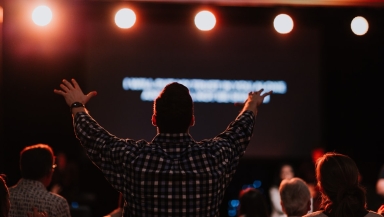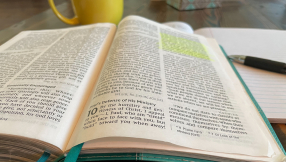
"But that's a cop out" is something I've heard so many times from people.
When this happens, I'm usually pointing out that demanding everyone stands, raises their hands, kneels or anything else your flavour of church does at various points during worship, can be difficult for some.
The implication of the statement 'it's a cop out' is: if you don't stand when (in their opinion) you could, you are not honouring God. Apparently, if you are holy, you stand even if it hurts or is difficult.
Thankfully, God doesn't measure holiness by posture.
A friend who struggles to stand due to their disability asked to be held up every time there was sung worship. He explained that 'the man at the front' said he had to stand to show he was really worshipping. It wasn't what the worship leader said, but that was what he heard.
He is not alone with this perception of being ordered to stand when we sing. Let me put this into context: for many, the instructions we are given in a place of worship are not accessible. Not everyone can stand, lift their hands, kneel or even sing. Not everyone can open up their Bible to read along with the person leading and not everyone can see or follow things written on a large screen.
This is not always due to a visible disability, it can be a hidden one where standing will mean using so much energy, doing anything else for the rest of the day will be impossible. Anxiety can make seeing things harder and standing exhausting. Physical multitasking for some neurodivergent people means much of what is happening will be lost in the onslaught of sensory overload.
I could give more examples, but I hope this makes it clear that "It's a cop out" is, in the majority of cases, totally wrong. It's also judgemental.
So here's my question back to those who say using inclusive language is a copout: who are we to judge?
The first Sunday school lesson I ever taught was about David being anointed king. The overall teaching point was "God looks at the heart". No one would have chosen David for what they saw. But his heart was one after God's heart. I learnt as much from that lesson as the children.
Surely, how people worship is between them and God and not to be judged by people who have not walked in their shoes.
There are many views, even amongst disabled people, about the language to use in churches when trying to be inclusive. Some don't like 'willing' because they are - they just can't.
Some like language that doesn't point out 'they aren't able' but want something that gives agency and acknowledges the fact that not everyone can stand to worship or raise their arms, or are possibly unable to sing.
Therefore, many disabled people understand that although they might not like the wording used, it's not just about them and their particular disability; the language is for everyone.
When we have used the 'willing and able' language, more disabled people than not have appreciated it, as have those with additional needs or are struggling with their mental health.
But those leading, who have a particular picture in mind about how people should behave and respond in church, often have a tough time thinking through this inclusive language and struggle to engage with it.
I've often experienced instructions on what to do for sung worship or prayer being given like a military general insisting we all do something.
Once, at a conference I was attending, the person praying told us that we should all stand to show God that we were serious about our prayers. He then proceeded to glare at those still seated and repeated his instruction that we needed to stand. Some tried to stand out of sheer embarrassment, others just couldn't and were in tears.
This is not an isolated story.
To say that giving a choice is a cop out ends up demeaning God too.
As I've said, it's God who looks at the heart, not us. We are not helping God out by being insistent about posture. He can smell the sweet aroma of genuine worship regardless of our posture - we can't.
What the Holy Spirit is doing in someone's heart is none of our business and we don't have a right to see any visible sign of it. It's a holy practice not to judge how serious someone's worship is by their posture.
Kay Morgan-Gurr is Co-Founder of the Additional Needs Alliance, part of the Evangelical Alliance Council. She is a visually impaired wheelchair user and blogs at www.ThePonderingPlatypus.com. Follow her on Twitter @kaymorgan_gurr













